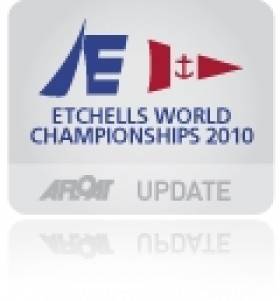Displaying items by tag: British Etchells tops on day 1
Razmilovic heads Etchells Worlds fleet after two races
The 2010 Etchells Worlds Championships started at Howth today (Monday 23rd) with two scheduled races sailed in freshening winds, with Ante Razmilovic of the UK holding a one point lead over Australian sailing legend John Bertrand at the end of the first day.
The first race, sailed in westerly winds steadily increasing in strength, saw Razmilovic open up a large lead by the windward mark, having gone to the right of the course on the first leg. While the 2009 Worlds runner-up Damien King of Australia closed the gap over the next three legs, it was not enough to deny the British boat a comfortable win.
Another British entry, Graham Bailey took third ahead of the winner's brother Nils Razmilovic (sailing for Singapore) while John Bertrand finished fifth. The leading Howth entry was Stephen Quinn & Stephen O'Flaherty in 11th place.
Winds had freshened considerably to 24 knots by the start of the second race, conditions which lead to some gear damage and one major collision. The conditions were, however, very much to the liking of Australian crews who filled the first three places.
John Bertrand took the gun ahead of his Royal Brighton YC clubmate Jake Gunther while former World Champion Peter McNeill, who recently won the Irish national title, took third spot ahead of Ante Razmilovic. Dan O'Grady of Howth was the best of the Irish in 15th place.
That result left Razmilovic the overall leader on five points after two races, one ahead of Bertrand and with Damien King in third place on seven points. The leading American entry is Jud Smith of Eastern YC in 6th while the top Irish boat in the overall standings is Howth's Stephen Quinn/Stephen Flaherty in 11th place.
Racing continues on Tuesday (24th) with one race scheduled on the programme.
Etchells World Championships (provisional results after two races):
Swedish Blue (UK) – Ante Razmilovic – 5 pointsTriad (Aus) – John Bertrand – 6 pointsBarry (Aus) – Damien King – 7 pointsArbitrator (UK) – Graham Bailey – 12 pointsMatatu (Singapore) – Nils Razmilovic – 12 points1224 (USA) – Jud Smith – 19 points





























































